R.W. Holmen's Blog: Spirit of a Liberal, page 5
November 7, 2013
Cast of characters countdown: Robert Mary Clement
On a June summer’s evening in 1969, a gay Catholic priest and his partner heard a disturbance a few blocks away from their Greenwich Village home. It seems a routine police raid on the Stonewall Inn, a gay bar, had gone awry, and the queers didn’t go quietly. Riots continued for the next couple of days, and the gay liberation movement was born.
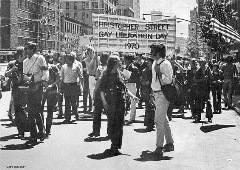 A year later, the priest and his partner prepared to participate in a parade to celebrate the one-year anniversary of the Stonewall riots. A light beamed from the Oscar Wilde bookstore, and as if drawn by a beacon, a few faceless strangers shuffled out of the shadows to gather in awkward silence. By the time the sun first peeked over Brooklyn across the East River, a crowd of hundreds milled about the bookstore that had become the de facto headquarters for the audacious planners of Christopher Street Liberation Day to celebrate the first anniversary of Stonewall. At the time, they didn’t realize they would make history in the first Gay Pride march.
A year later, the priest and his partner prepared to participate in a parade to celebrate the one-year anniversary of the Stonewall riots. A light beamed from the Oscar Wilde bookstore, and as if drawn by a beacon, a few faceless strangers shuffled out of the shadows to gather in awkward silence. By the time the sun first peeked over Brooklyn across the East River, a crowd of hundreds milled about the bookstore that had become the de facto headquarters for the audacious planners of Christopher Street Liberation Day to celebrate the first anniversary of Stonewall. At the time, they didn’t realize they would make history in the first Gay Pride march.
Father Robert Mary Clement, a priest associated with Old Catholicism, a non-Roman spinoff, donned his priestly garb, like he did every Sunday, while his partner prepared a placard and orange flyers that they would distribute at the parade. Father Clement’s presence in the parade garnered much attention, especially by the press and the picture-takers, second only to the drag queens; after all, he marched as an openly-gay priest, in collar and cassock, carrying the banner, “Gay People This Is Your Church.” Meanwhile, his partner distributed their colored fliers inviting queers to attend The Church of the Beloved Disciple.
A few weeks later, the tiny congregation of the Church of the Beloved Disciple paid more than they could afford to rent the spacious sanctuary of Holy Apostles Episcopal church in lower Manhattan, but as the time drew near for the Sunday afternoon service, it appeared that their invitation to the Christopher Street marchers would go unheeded. Father Clement peeked out from the sacristy fifteen minutes before the start and there was no one there, but then:
Two o’clock, we opened the side sacristy door for our procession. We couldn’t believe it. It wasn’t just that every seat in the church was filled, the aisles were packed. That church, which would hold maybe six hundred plus in a squeeze, had over eight hundred people in it, and we don’t know how many people were turned away that day who couldn’t get in.
Because we had all the Protestants, the Orthodox, the Catholics. And on top of it all, you had, the most incredible thing, we had Jewish people, a lot of them. Because they wanted a home. Even though it was Christian, people were seeking God, they were seeking a relationship to the divine, and they would come to us because everyone else had rejected or turned them away. They had nowhere to go. [emphasis added]
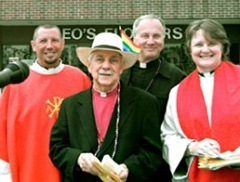 In the early years of the decade of the ‘70s, the Church of the Beloved Disciple would be a safe haven for gays and lesbians of lower Manhattan. Father Clement and his partner would later relocate to California where Father Clement became an archbishop for an independent Catholic group, and he has remained active in the interfaith LGBT movement on the west coast.
In the early years of the decade of the ‘70s, the Church of the Beloved Disciple would be a safe haven for gays and lesbians of lower Manhattan. Father Clement and his partner would later relocate to California where Father Clement became an archbishop for an independent Catholic group, and he has remained active in the interfaith LGBT movement on the west coast.
This brief biographical sketch is merely a snippet, and Father Clement’s story receives greater treatment in Queer Clergy: A History of Gay and Lesbian Ministry in American Protestantism.
Related Posts:Cast of characters countdown: Troy PerryGays in the PulpitQueer Clergy EndorsementsCall me ObieSynopsis of “Queer Clergy”
November 6, 2013
Cast of characters countdown: Troy Perry
Queer Clergy recounts the journey toward full LGBT inclusion in the church, and readers will encounter many pilgrims along the way. As we countdown to the release of the book (now looking like the end of November), I will provide brief biographical sketches of some of the wayfarers who criss-cross the pages of the book.
Troy Perry was born to a family of bootleggers in the Florida panhandle, and he exhibited a youthful bent toward preaching. Perry became a Baptist preacher at age 15, married a preacher’s daughter at age 19 with whom he fathered two children, and was assigned as pastor to a Pentecostal Church in Santa Ana, California at age 22. Six years later he attempted suicide after he had been defrocked and divorced, and then life got interesting.
 In October 1968, 8 months before the Stonewall riots of Greenwich Village marked the birth of the gay liberation movement, Perry held a worship service in his Los Angeles home for members of his gay community. Twelve persons dared to show up. They sang. They read Scripture. They prayed. Perry preached. They shed tears as they shared bread and wine.
In October 1968, 8 months before the Stonewall riots of Greenwich Village marked the birth of the gay liberation movement, Perry held a worship service in his Los Angeles home for members of his gay community. Twelve persons dared to show up. They sang. They read Scripture. They prayed. Perry preached. They shed tears as they shared bread and wine.
That was the first worship service of what became the Metropolitan Community Church (MCC) movement with hundreds of predominantly gay congregations popping up around the country and around the world in what would become the first welcoming church for gays and lesbians at a time that the rest of Christendom, including the mainline, Protestant denominations, remained hostile.
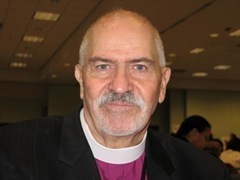 In the early years, the MCC survived several arsonist fires, including a horrendous tragedy in New Orleans that claimed the lives of 32 persons. By the time of Perry’s retirement in 2005, the MCC had grown to over 250 congregations in 26 countries with 43,000 members.
In the early years, the MCC survived several arsonist fires, including a horrendous tragedy in New Orleans that claimed the lives of 32 persons. By the time of Perry’s retirement in 2005, the MCC had grown to over 250 congregations in 26 countries with 43,000 members.
Of course, the book goes into greater detail.
Related Posts:Gays in the PulpitSynopsis of “Queer Clergy”Queer Clergy EndorsementsThe Muse is FoundSubmissive wife?
October 30, 2013
Last minute edits
Last week, I read my Queer Clergy manuscript for the umpteenth time. As I tell my wife, sometimes I really like it and other times I think it is fluff. This latest re-reading of the manuscript marked up by Pilgrim Press copy editor, Kris Firth, was positive. Perhaps it was her editorial feedback:
I applaud you on your scholarship, writing, and the scope of the material, but also on the excellent condition of the manuscript. It’s obvious that you have had editorial review prior to submission.
Actually, the MS hadn’t been edited previously, except by me, but I confess to nit-picking scrupulosity. In any case, her suggested edits are now in place, and the “page proofs” will be available for final review soon. Galley copies are in the hands of potential reviewers, and I wait, mindful of my days as a trial attorney, sucking in a long, deep breath as the jury shuffled out of the courtroom to begin deliberations.
Related Posts:My Writing JourneyA Wretched Man reader commentsQueer Clergy EndorsementsEleven Bravo and LRRP Rangers of Vietnam: First review“Prowl”: Reader Comments
November 17, 2011
Gays in the Pulpit
I have several writing projects underway. I recently posted about Prowl, a compilation of five short stories based upon my Vietnam experience. I have also been working on a sequel to A Wretched Man. Third, last spring I started work on a non-fiction piece, tentatively titled Gays in the Pulpit, which will be a forty-year retrospective on the gay rights movement within the church. Now that we are settled into our new digs in Arlington Heights, I have again picked up that project in earnest.
I am personally acquainted with many of the more recent heroes of the push for full inclusion including Lutherans Anita Hill, Ruth Frost, Phyllis Zillhart, and Emily Eastwood; United Methodist Amy Delong; and Presbyterian Scott Anderson. If you click on their names, you will link to prior blog posts about these individuals.
My current research is also introducing me to earlier heroes. In 1968, Troy Perry was a gay Baptist/Pentecostal preacher who founded the Metropolitan Community Church, which now numbers over 250 predominantly gay congregations internationally. Father Robert Mary Clement was a gay priest who marched in the first gay pride parade in Greenwich Village and whose Beloved Disciple Church ministered to the gay community of New York City in the early '70s. Bill Johnson was the first openly gay man ordained by an established denomination way back in 1972 by the United Church of Christ. Ellen Barrett was the first out lesbian to become an Episcopal priest in 1977.
As I am reviewing the data from these early days, I have received invaluable assistance from Rev. Clyde Steckel, retired dean of the United Seminary of the Twin Cities. Rev. Steckel was witness to and participant in the UCC steps toward gay inclusion in the '70s. The record in the UCC is striking because they were so far ahead of the other mainline denominations. The UCC accomplishments in the 1970s foreshadowed the actions of the Episcopalians, Lutherans, Presbyterians, and Methodists a full generation later.
More to come.
Related Posts:A Wretched Man novel: 3rd Review is inWe get letters, we get stacks and stacks of lettersWriting my novel: What time and place would you visit?The Muse is FoundBook Review: The First Paul by Borg & Crossan (Part 1)
September 15, 2011
A Wretched Man Movie?
About six weeks ago, I was contacted by a Hollywood screenwriter who expressed interest in adapting A Wretched Man, a novel of Paul the apostle into a screenplay. Following discussions and negotiations, we have today reached agreement. The screenwriter, who has been in the movie industry for nearly a decade, shares my vision and passion. In his first email to me, the screenwriter commented:
I am fascinated by the story and believe that it could make a really intriguing film—something independent, honest, touching … a film that takes these Biblical giants and makes them accessible, human, and endearing. What I like about your take on the story is that when Paul is wounded—it actually seemed to hurt. I think a movie like that would speak to many.
Whether A Wretched Man reaches the silver screen or not remains a long shot. After a screenplay is completed, the screenwriter must then persuade a producer or other monied interests to invest in a film, but I am convinced that the screenwriter has the appropriate experience, expertise, and contacts to give it a good shot.
Indulge me in a bit of fantasy. For those of you who have read the book, what actor should play the role of Paulos? Shall I, a la Hitchcock, play a cameo role? Perhaps the character of Eli the sage? Or Jubilees, the phantom seer?
Related Posts:ELIJAH FIRE: Coming to a Theater Near YouEleven Bravo and LRRP Rangers of Vietnam: First reviewBook Review: The Bible and Homosexual Practice by Robert GagnonLost Christianities by Bart D. EhrmanA book review from New Zealand
August 12, 2011
Submissive wife?
At the Republican debate last night, Michelle Bachman was asked whether she was a submissive wife. Perhaps the question itself was sexist, but prior Bachmann statements suggested that she accepted certain Biblical writings about women rather literally, and the question was asked against that background:
It is a philosophy that Michele Bachmann echoed to congregants of the Living Word Christian Center in 2006, when she stated that she pursued her degree in tax law only because her husband had told her to. "The Lord says: Be submissive, wives. You are to be submissive to your husbands," she said. [referring to Titus 2:5]
Last night, Bachman responded to the question by suggesting she "respected" her husband. Equating "to submit" with "to respect" is more than a tiny stretch, but I'm sure her minions were satisfied with her Biblical exegesis.
Coincidentally, New Testament scholar Dom Crossan suggested a better way of dealing with Paul's alleged sexism in a Huffpost blog article yesterday. It is Crossan's thesis that Paul was actually a flaming women's libber that subsequent generations of the church needed to tone down. The blog post was merely a snippet in a popular medium of a theme that Crossan, Marcus Borg, and many current Biblical scholars have promoted in more scholarly media.
The basic thesis is that Paul was essentially egalitarian—there is no longer Jew or Greek, there is no longer slave or free, there is no longer male and female—in his own writings but the pastoral Epistles (1st & 2nd Timothy and Titus) were written by others in order to correct Paul. This is the central thesis of The First Paul, co-authored by Borg and Crossan and reviewed here. This seems to me to be a more intellectually honest way to approach the sexism of Titus and the 1st Timothy passage below:
I permit no woman to teach or to have authority over a man; she is to keep silent. 1st Timothy 2:12
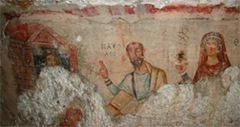 Although his thesis is not new, Crossan adds a new argument; he uses a defaced, early fresco to further his point. Crossan claims the defacement of the fresco demonstrates the shift away from the egalitarian early church to the patriarchal church of a later generation.
Although his thesis is not new, Crossan adds a new argument; he uses a defaced, early fresco to further his point. Crossan claims the defacement of the fresco demonstrates the shift away from the egalitarian early church to the patriarchal church of a later generation.
The historical Paul is being pulled — kicking and screaming — away from Christianity's radical past and into Christianity's Roman future. As with owner and slave so also with male and female, hierarchies rejected by Christian radicality — in, for example, Galatians 3:26-28 — are being retrofitted into Roman normalcy.
Related Posts:Book Review: The First Paul by Borg and Crossan (Part 2)Dom Crossan and Paul the apostleBook Review: The First Paul by Borg and Crossan (Part 3)Book Review: The First Paul by Borg & Crossan (Part 1)Book Review: The Bible and Homosexual Practice by Robert Gagnon
July 14, 2011
ELIJAH FIRE: Coming to a Theater Near You
Probably not.
I received an email last night from a wannabe movie producer who sought permission to use Elijah Fire, the fifth and latest installment of my Vietnam short stories, as the basis for a screenplay and movie.
"Of course," I said, "and here's where to send the royalty checks."
Though the prospects for success are pretty unlikely, it is still gratifying to be asked.
According to an account in the Old Testament, the prophet Elijah called for fire to rain down upon his enemies. "If I am a man of God, let fire come down from heaven and consume you and your fifty." 2nd Kings 1:10. This installment of Vietnam short stories is about the firepower at the disposal of LRRP teams, scouts alone in the boondocks, that included artillery, Phantom jets, and especially helicopter gunships, the Cobras. But, a team calling down hellfire risked getting burned.
Related Posts:Chasing After WindEleven Bravo and LRRP Rangers of Vietnam: First reviewThe Muse is FoundA book review from New ZealandMore blog attention for A Wretched Man
July 6, 2011
Dom Crossan and Paul the apostle
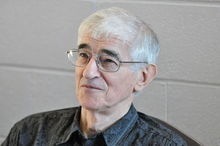 Former Catholic priest John Dominic Crossan is a co-founder and highly visible spokesman for the Jesus Seminar, a progressive group of New Testament scholars active in the last twenty years seeking to identify "the historical Jesus".
Former Catholic priest John Dominic Crossan is a co-founder and highly visible spokesman for the Jesus Seminar, a progressive group of New Testament scholars active in the last twenty years seeking to identify "the historical Jesus".
Recently, he has turned his attention to Paul the apostle. A few years ago, he co-authored, with Marcus Borg, an excellent book entitled The First Paul (2009), which I reviewed in three separate posts. Here's a link to the three posts in reverse order. The central thesis of the book is that the thirteen New Testament books traditionally ascribed to the pen of Paul the apostle may be broken into three groupings: a) the radical and authentic Paul who was a social visionary vis a vis the existing culture—an opponent of slavery and proponent of a strong role for women, b) the conservative Paul, three books that may have been written by Paul but probably weren't and which evinced a retreat from his radical social views, and c) the reactionary Paul, the so-called pastoral epistles consisting of 1st & 2nd Timothy and Titus, which were definitely not written by Paul and indeed were written to correct Paul's radicalism, to re-establish the Roman social order of slavery and patriarchy.
Crossan is again writing about these themes in a highly public forum, the Huffington Post. His article is not only on the religious section of the Huffpost, but appears on the main page under the banner The Search for the Historical Paul: Which Letters Did He Really Write? As I write this, there are over 200 comments to Crossan's Huffpost article, and like many public cyberspace forums, the "trolls" dominate. Many are anti-Christian, and a few are conservative Christians who insist, even if the human authorship is not Paul, that the subsequent letters were "spirit-breathed" and thus all letters are consistent and true (the holy trinity of inerrant, infallible, and inspired).
Crossan's article is brief and seems not to plough new ground but merely restates the conclusions voiced earlier in the collaboration with Borg. Here is the central thesis of the Huffpost article:
The problem is that those post-Pauline or Pseudo-Pauline letters are primarily counter-Pauline and anti-Pauline. What happens across those three sets of letters is that the radical Paul of the authentic seven letters (Romans, 1-2 Corinthians, Galatians, Philippians, 1 Thessalonians, Philemon) is slowly but steadily morphed into the conservative Paul of the probably inauthentic threesome (Ephesians Colossians, 2 Thessalonians) and finally into the reactionary Paul of those certainly inauthentic ones (1-2 Timothy, Titus).
Crossan's article includes this recently rediscovered and cleaned up fresco of Paul dating to the 13th century. 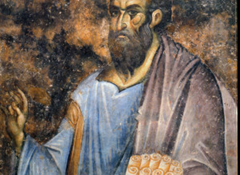 Note that Paul holds not one scroll and not thirteen scrolls but ten, signifying that the dubious authenticity of the pastoral epistles is not merely a recent understanding. Indeed, in 2nd century lists of authoritative books that served as precursors to the formalized New Testament canon, the pastoral epistles are generally not included.
Note that Paul holds not one scroll and not thirteen scrolls but ten, signifying that the dubious authenticity of the pastoral epistles is not merely a recent understanding. Indeed, in 2nd century lists of authoritative books that served as precursors to the formalized New Testament canon, the pastoral epistles are generally not included.
By the time The First Paul was published in 2009, my own manuscript for A Wretched Man, a novel of Paul the apostle was already completed and in the hands of the publisher. Thus, my research did not include The First Paul, but my conclusions were similar–but I had a special authorial problem. In a novel about the life of Paul, how could I suggest that six books traditionally attributed to him were not actually his? Written after his death, such books were not part of his story in a strict sense. Additionally, how could I make the point that he held radical views regarding slavery and women to rebut the traditional stereotype of Paul derived from the NT letters to Timothy and Titus?
My solution was two-fold. First, the novel included the circumstances and the writing and the delivery of the seven "authentic" letters. The six "inauthentic" letters were not mentioned at all, an implicit but indirect statement that they were not part of Paul's story. Second, Timothy and Titus were important characters in the novel, protégés of Paul. In a purely fictional device, I placed offensive words about women quoted from the NT book of Timothy in the mouth of Timothy the character and offensive words about slavery from the NT book of Titus in the mouth of Titus the character. In both instances, the novel offers a strong rebuke from the lips of Paul.
Related Posts:Book Review: The First Paul by Borg and Crossan (Part 2)Book Review: The First Paul by Borg and Crossan (Part 3)Book Review: The First Paul by Borg & Crossan (Part 1)A Wretched Man novel: 3rd Review is inWhat did Paul the Apostle look like? UPDATED
May 6, 2011
Chasing After Wind
In the hubbub of news about the capture/kill of Bin Laden, the professional soldiers/sailors that carried out the mission have justifiably received a heap of attention. The "tip of the tip" of the spear is one characterization I have heard. "Seal 6" is apparently the name of this elite group of ultra-efficient military men. Other terms that have been bandied about in the general conversation about the elites of the combat soldier include Navy Seals, Army Rangers, Special Ops, Special Forces, and more.
This is where the news gets personal, for I was an Army Ranger in Vietnam forty years ago. Coincidentally, I have recently been working diligently to write short stories based upon my Vietnam experience, so those days and months so long ago have revisited my memory.
Although there are references to Rangers in the colonial wars, Revolutionary War, and Civil War, the first modern use of the term comes from the D Day assault on Normandy. While waves of combat soldiers waded ashore on the beaches, the Rangers successfully scaled the cliffs of Pointe du Hoc in order to take out an artillery battery that shelled the beaches and the landing craft. In the Pacific theater, Merrill's Marauders successfully traversed 1,000 miles of Himalayan mountains and Burmese jungle to slip behind the Japanese lines, and every single member of the unit received a bronze star.
With the outbreak of the Korean conflict, Ranger units were again formed and trained, including the only all-black combat unit in the war. The Ranger units were used for night raids, remote patrols, and parachute assaults behind enemy lines. After the end of the Korean conflict, the Rangers were disbanded and did not appear again until Vietnam.
 Ranger units of Vietnam, including my outfit, K Company of the 75th Infantry Regiment, were Long Range Reconnaissance Patrol units (LRRP for short). Recon in remote and hostile territory was the primary mission of our four-man LRRP teams rather than ambush or assault, but we fought when we were discovered, and I was awarded a pair of bronze stars for valor in combat.
Ranger units of Vietnam, including my outfit, K Company of the 75th Infantry Regiment, were Long Range Reconnaissance Patrol units (LRRP for short). Recon in remote and hostile territory was the primary mission of our four-man LRRP teams rather than ambush or assault, but we fought when we were discovered, and I was awarded a pair of bronze stars for valor in combat.
Other than the concept of the stiletto–a small, surgical, strike force—my experience was vastly different from the Rangers of today, much less the secretive Seal 6. Our training, equipment, and level of expertise were Neanderthal by comparison. While many in my unit had received training at Ranger school at Fort Benning before arriving in Vietnam, nearly all were combat newbies. I had no specialized training at all, but I was accepted into the Rangers based upon six weeks of combat experience with an infantry company.
An early review of my series of short stories suggests bold, dark, and intense, and I think that is an apt characterization, not only of my writing, but of the Vietnam experience. This week, the fourth installment was published, and you may find the eBook entitled Chasing After Wind with the publisher or with Amazon.com, and it treats dark themes of death and fate on the framework of a barracks poker game, the uncontrollable wind, and a malevolent joker in the deck.
Ecclesiastes provides the epigraph and the title:
No one has power over the wind to restrain the wind, or power over the day of death; there is no discharge from the battle … all is vanity and a chasing after wind.
Ecclesiastes 8:8 & 1:14
April 26, 2011
Eleven Bravo and LRRP Rangers of Vietnam: First review
Reviews—necessary but scary. I'm reminded of the analogy told by a fellow writer who compared the process to dropping one's pants in public and then listening politely and silently as the bystanders offer comments.
Eighteen months ago, the first reviews of my soon to be released novel, A Wretched Man, a novel of Paul the apostle were published based upon advance reader copies . They were favorable, and I was relieved, flattered, and more than a little surprised. A writer may hope, but self doubt is omnipresent.
I am now in the same posture with the release, in serial fashion, of my short stories of Vietnam. The series is entitled LRRP Rangers Vietnam, and the first three installments have been published as eBooks. Today, the first review of the first installment was published online, and I am experiencing the same response as earlier–relief and surprise at the flattering comments, and so I boast …
Ms. Sheila Deeth read and reviewed the first installment, Eleven Bravo. She introduces her review with this summary:
Eleven Bravo, by R.W. Holmen chronicles the beginning of a young man's experience in Veitnam. With pitch-perfect dialog and stunning descriptions and commentary, he brings a time not too long gone to life and clears the way for a series of literary vignettes to come–short, but bold, dark and intense, so read it with a 5-star coffee.
Her full review is reprinted below.
"Somehow, I felt abandoned and much farther away than the man on the moon," says R.W. Holmen in his short story Eleven Bravo.
The author conveys that abandonment beautifully, setting the Vietnam war into personal and global context with vivid details and telling comments. Characters and place come to life with the words, dialog is pitch perfect, and there are haunting comments I'll remember long after the story's done. From FNG (f** new guy) to savvy vet in twenty-three days, from one land to another with various stops for training along the way, from safety to horror, the author shares the experiences of war, bringing sight, scent, and sound into stunning perspective. Climbing in mud with eighty-pound packs, fools on the march while the "fool killer" trails, clearing brush with machetes, arranging mines… the bond and the folly of immortal combat ring loud and clear from the page, and the story's told with all the realism, language and pathos of experience.
Eleven Bravo is the first in a series of Vietnam vignettes, autobiographical fiction based on true events and bound by story arc into literary gems. The writing is confident and clear, hauntingly honest, brutally true. The story completes a young man's transformation and leaves the reader eager for the next installment. If this piece is anything to go by, this will be an excellent series of honest depiction and wise commentary, and I'm humbled to have read this first chapter.
Sheila Deeth, writer, illustrator, and prolific book reviewer




